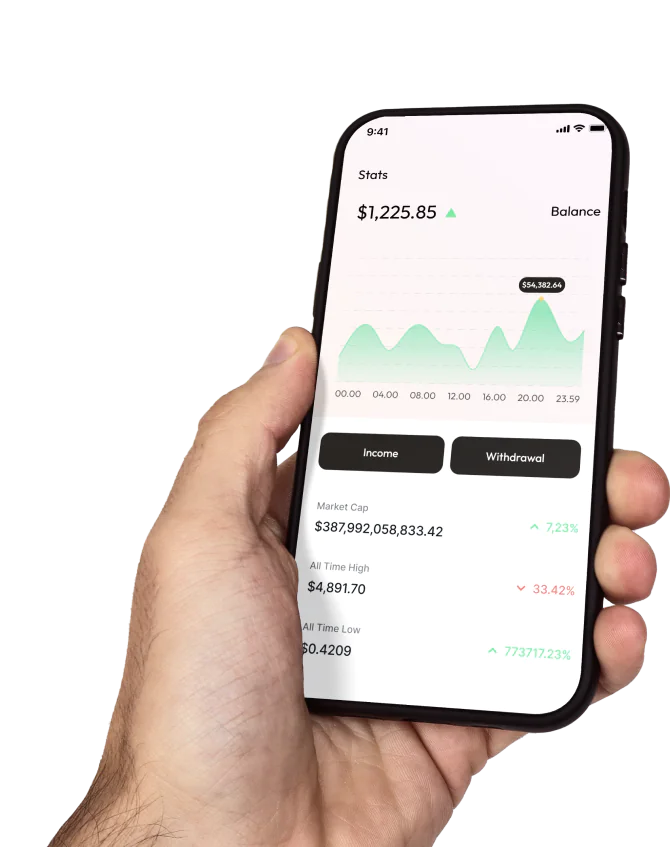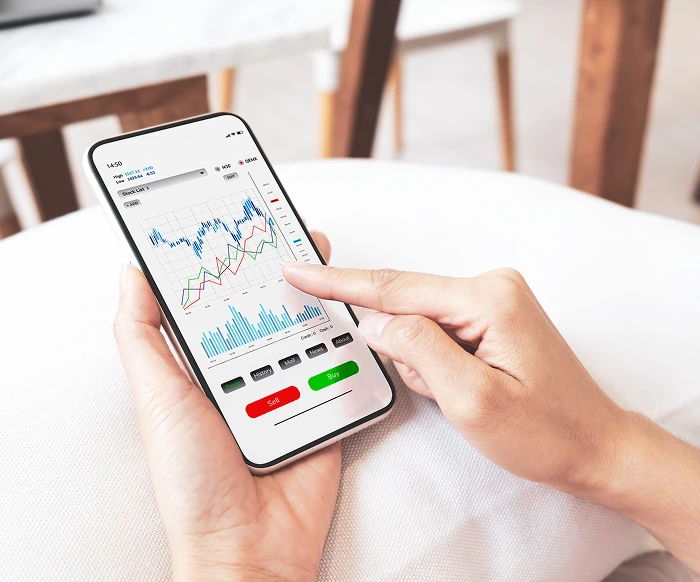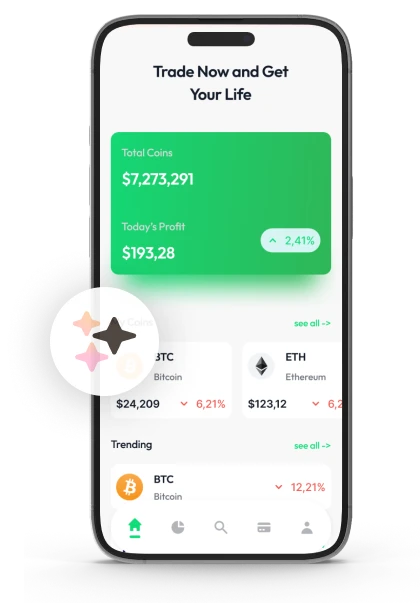Trader Ai:
Trader Ai Tracks Shifting Crypto Conditions With Intelligent Insight
Sign up now

Sign up now

A coordinated analytical layout inside Trader Ai forms a balanced structure that stabilises uneven cycles and supports steady observation. Changing impulses settle into defined sequences that move cleanly through varying conditions, shaping a dependable rhythm for interpreting evolving market behaviour with consistent clarity.
Refined computational design in Trader Ai separates major structural motion from subtle corrective phases. Gradual recalibration maintains uniform perspective while pace intensifies or eases, guarding interpretive flow through compressing or expanding movement ranges. This organised method supports lasting visibility and maintains dependable assessment throughout demanding environments.
Dedicated assessment layers within Trader Ai compare shifting readings with stable reference logic to sustain reliable recognition. As dispersed activity realigns into coherent form, interpretive balance strengthens without crossing into execution functions. Trader Ai performs no trades and remains centred on structured evaluation. Cryptocurrency markets are highly volatile and losses may occur.

Trader Ai evaluates shifting pace through coordinated insight channels that stabilise abrupt motion with structured pacing. Sudden surges shift into measured phases, forming a reliable cadence across active conditions. Its organised configuration reshapes data into steady progression, retaining balanced proportion as behaviour slows or intensifies. Each adaptive layer enhances directional awareness, ensuring clear recognition across continuous shifts.

Operational modules under Trader Ai transform dispersed readings into unified logic that supports continued observation through demanding conditions. Incremental recalibration reinforces durable clarity while sustaining proportion as broader activity rises or cools. Each protective layer maintains structured visibility during abrupt motion, differentiating stable directional flow from momentary irregularities that distort judgement. The system deepens interpretive accuracy through aligned progression.

Through Trader Ai, live analytical layers match developing movements with established formations to highlight stable tendencies within active cycles. Fresh signals align with refined markers that reveal consistent structural paths otherwise hidden by uneven volatility. The system uncovers strengthening segments that typically form before sustained movement, positioning directional clarity well ahead of wider recognition. Cryptocurrency markets are highly volatile and losses may occur.

Trader Ai functions as a layered insight engine that reshapes changing activity into a steady interpretive route. Each adjustment settles into structured alignment, guiding movement without distorting internal proportion. The system stabilises rapid expansions and controlled slowdowns through coordinated recalibration, forming refined analytical tracks that keep clarity intact through varied market transitions.

At its foundation, Trader Ai builds dependable interpretation through defined segmentation and organised reference logic. Functioning independently from any exchange links, the platform centres on structured evaluation and safeguarded insight mapping. Encrypted layers maintain steady flow, while controlled operations reinforce long term accuracy across ongoing assessment. Cryptocurrency markets are highly volatile and losses may occur.
Trader Ai delivers a guided framework where scattered readings shift into coherent mapping. Swift variations and subtle adjustments transition into structured patterns that raise interpretive awareness. Modular analytical components reshape irregular signals into consistent pathways, ensuring dependable clarity across extended periods. Its function lies in refining orientation, coordinating timing, and anchoring understanding without involving any execution activity.
Within Trader Ai, coordinated analytical pathways translate shifting activity into structured flow suitable for uninterrupted tracking. Measured adjustments maintain proportion as conditions fluctuate, producing a consistent interpretive path that avoids distortion. Aligned pacing supports stable recognition while refined sequencing converts brief variations into coherent insight. This approach enables reliable awareness throughout rapid changes.
Inside Trader Ai, progressive alignment stages merge alternating developments into a unified interpretive form. Each recalibrated segment refines fluctuation into steady patterns that sustain structural direction. The system balances coordinated movement with controlled spacing, ensuring proportional evaluation through evolving pace shifts. As activity intensifies, uneven tendencies settle into organised structure that deepens clarity and expands reliable awareness.
Trader Ai redirects shifting elements into structured alignment, isolating uneven changes without weakening analytical form. Each coordinated refinement reveals stable progression by merging calibrated responses into cohesive mapping. Consistent arrangement maintains continuity, enabling orderly development throughout irregular conditions. This deliberate sequencing uncovers subtle transitions that strengthen dependable visibility while supporting balanced interpretation across extended phases.
Through sequenced processes, Trader Ai links active readings with established markers to identify reliable behavioural transitions within evolving environments. Each comparison anchors developing movement to proportional references that stabilise changing patterns. Repeated refinement enhances interpretive awareness while upholding logical structure across shifting conditions. Cryptocurrency markets are highly volatile and losses may occur.
Trader Ai interprets shifting movements without disrupting structural direction. Each gradual change receives calibrated processing to support uninterrupted progression across varied conditions. Targeted refinement converts irregular behaviour into balanced sequences, enabling consistent clarity throughout active phases. This structured approach maintains dependable recognition as surrounding momentum accelerates or contracts.
Trader Ai forms cohesive analytical paths that redefine unpredictable motion into clear structural flow. Rapid variations settle into converging formats that advance interpretation rather than fracture it. Each layered review strengthens directional balance and elevates uniform guidance through continuous market rotation. Entirely separate from execution functions, Trader Ai remains dedicated to neutral evaluation supported by calibrated mapping.
Inside Trader Ai, rising energy, moderated pullbacks, and softened surges merge into consistent interpretive routes that maintain reliable structure. Adaptive filtration organises reactive behaviour, steadies motion shifts, and restores balanced clarity during fluctuating sequences. Responsive configurations regulate pacing and cadence, enabling coherent visibility across dynamic momentum patterns.
Unaffected by execution processes, Trader Ai focuses exclusively on structured analysis. Its refined recalibration enhances clarity as conditions intensify or settle. Cryptocurrency markets are highly volatile and losses may occur.
Layered interpretation stages and consistent verification refine Trader Ai. Each processing route aligns with stabilised judgement and controlled adjustment, removing disruptive shifts while maintaining dependable evaluation. Every segment reinforces resilience through precise mapping, supporting balanced understanding even as broader conditions fluctuate.

Disciplined observation enhances reliable structure through measured signal pacing. Using rotational pattern logic, Trader Ai maintains steady perspective during elevated surges and easing cycles. Logged sequences and recurrent pathways highlight momentum aligned with long established behaviour rather than erratic deviation, producing clear movement direction grounded in organised structure.
Inside Trader Ai, targeted observation layers detect early directional markers. These refined cues reveal forming sequences, connecting advancing behaviour with proportional alignment as new stages develop.

Advanced multi level mapping within Trader Ai sharpens clarity when changes accelerate. Controlled realignments convert shifting behaviour into organised reading. Using calibrated refinement, scattered impulses merge into steady progression, generating cohesive understanding that advances analytic precision.
Broader sequences unfold through sustained structures rather than abrupt surges. Throughout Trader Ai, each developing movement is interpreted for scale, pacing, and relation to wider patterns. Strengthened climbs and consistent adjustments support a long form cycle that reinforces continuing awareness. Cryptocurrency markets are highly volatile and losses may occur.
Strategic modulation around Trader Ai arranges fluctuating behaviour into balanced flow. Each recalibrated shift follows defined guidance instead of irregular movement, maintaining uniform proportion when acceleration rises or drops. Broader motion transitions into stable cadence as fractured impulses soften, enabling dependable interpretation through advancing or easing cycles.
Through progressive refinement, Trader Ai separates enduring directional build from short lived fluctuation, supporting dependable judgement during challenging conditions. Its layered design reviews pacing, trend development, and extended sequence behaviour to highlight forming signals across expanding environments. Each refined stage reshapes irregular motion into consistent, measurable patterns.
Inside Trader Ai, multi channel tracking interprets shifting sequences as conditions change suddenly. Staged pathways reveal strengthening positions, softer segments, and early signs of directional transformation, enabling quicker recognition of defined flow.
Organised mapping regulates spacing, timing, and structural order. Gentle surges combine with moderated easing while balanced steps convert uneven motion into coherent progression supported by symmetrical interpretation.
With adaptive filtration at the core, Trader Ai deepens structural awareness during continuous observation. Sequential comparison arranges scattered activity into unified recognition that enhances broader interpretation through coordinated stages. Cryptocurrency markets are highly volatile and losses may occur.

Emerging directional structure forms before wider recognition develops. Trader Ai organises quick surges, measured shifts, and alternating momentum into defined analytical stages. Smaller variations signal early transition points, while broader movements confirm extended progression.
Dominant forward pressure indicates growing interest, whereas slower segments reflect stabilised phases. Combined motion settles into structured expansion, where measured adjustments or widening flows highlight increased participation across broader conditions.
Within its interpretive layers, Trader Ai aligns continuous assessment with coordinated balance. Guided thresholds and refined modulation convert uneven signals into coherent rhythm. Calibrated stages steady abrupt changes into proportional mapping, shaping irregular shifts into consistent analytical flow. Cryptocurrency markets are highly volatile and losses may occur.

Liquidity rotation, paced transitions, and large scale movements constantly influence valuation direction. These elements interact with sentiment patterns, volume cycles, and structural tendencies. In these conditions, Trader Ai uncovers external triggers forming advancing structures, revealing compression signals or early stabilisation through ordered development.
Trader Ai aligns immediate readings with structured models established across earlier cycles. Comparative mapping identifies where strengthening or reduction emerges, highlighting regions where directional build or easing momentum becomes clear.

Market developments seldom repeat precisely, yet recognisable structures return within broader movement. Trader Ai integrates adaptive logic with accumulated datasets, aligning current behaviour with long range patterns to enhance clarity.
With repeated evaluation, Trader Ai reveals strengthening sequences, fading cycles, and balanced corrections. Each rising motion, shifting segment, or moderated retreat displays unique characteristics during transition, showing how movement stabilises before strengthened continuation or controlled pause during shifting phases.

Measured pacing limits distortion and supports consistent structure across shifting behaviour. Inside Trader Ai, evenly distributed processing keeps each segment aligned with identical scrutiny, preventing narrow focus on isolated spikes. Timed recalibration merges fresh activity with core pathways, preserving uniform interpretation throughout advancing sequences.
Trader Ai refines adaptive filtration to detect directional changes at the earliest stage. Mild resistance, a soft reversal, or compressed movement may signal forming strength before wider confirmation. Inside its framework, these markers shift into defined patterns, translating scattered impulses into cohesive development.
Momentum grows steadily during organised conditions. Without focused observation, early structural build may appear muted until sustained expansion becomes visible. Trader Ai separates short lived irregular movement from durable formation through proportional recalibration, revealing how extended stretches offer consistent movement while limiting unnecessary fluctuation. Cryptocurrency markets are highly volatile and losses may occur.
Autonomous analytical tiers within Trader Ai operate as continuous monitors, revealing subtle directional cues often overlooked during rapid shifts. Vigorous surges and tempered retreats settle into extended sequences, shaping irregular behaviour into steady progression. Each recalibrated segment forms structured continuity, exposes renewed transitions, and establishes balanced recognition across changing digital conditions.
Trader Ai aligns instant readings with multi layered interpretation, shifting smoothly as intensity changes or direction alters. Adaptive pathways remain consistent, uncovering recurrent tendencies through evolving patterns. Structured mapping merges expansion, pauses, and controlled reversals into coherent interpretation suited for lasting clarity.
Analytical control remains independent while Trader Ai adjusts alongside new developments, balancing proportion without affecting directional flow. This preserved structure maintains dependable continuity through unstable environments, drawing clear interpretation from fluctuating market rhythms. Cryptocurrency markets are highly volatile and losses may occur.

Trader Ai analyses flowing data inputs supported by adaptive AI layers that track rhythm changes, momentum stages, and subtle divergence signs. Observational cycles reveal forming behaviour without triggering execution, enabling neutral study and uninterrupted review.
Machine learning functions within Trader Ai assess evolving signals against structured guidance, adjusting spacing and proportion as conditions intensify. This strengthens interpretive accuracy and limits erratic distortion throughout rapid fluctuation, operating independently from any crypto exchange.
Copy-mapping utilities in Trader Ai reveal strategic sequencing, ratio balance, and timed progression, highlighting decision structures without replicating trades. These systems enhance comprehension and preserve continuous analytical clarity. Cryptocurrency markets are highly volatile and losses may occur.
| 🤖 Initial Cost | Registration is without cost |
| 💰 Fee Policy | Zero fees applied |
| 📋 How to Register | Quick, no-hassle signup |
| 📊 Educational Scope | Offerings include Cryptocurrency, Forex, and Funds management |
| 🌎 Countries Serviced | Operates globally except in the USA |